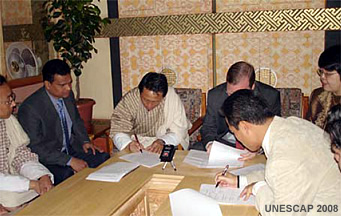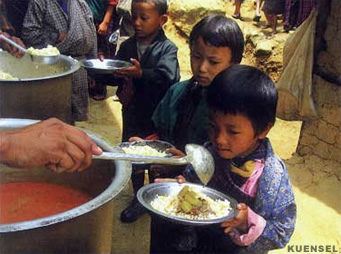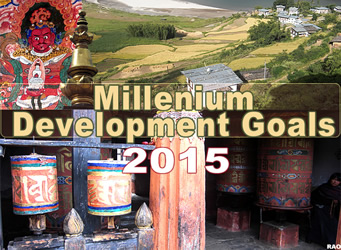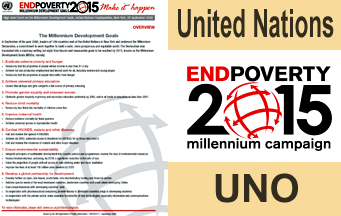 |
Bhutan Development |
|
 |
Bhutan Information |
|
|
 |
| United
Nations System in Bhutan |
| UN
Millennium Development Goals: Bhutan & the UN system in addressing
priorities |
 |
 |
| The
UN System in Bhutan will support the Royal Government to tackle some of
the challenges the country faces in achieving the MDGs
by 2015 and upholding poverty reduction as the overarching goal
of the 10th Five Year Plan. An agreement to this effect was signed on 19/03/2008
between the Secretary of the GNH Commission Mr.
Karma Tshiteem and the Representatives of UNDP, UNFPA, UNICEF, UNV and
WFP. |
|
This illustrates the UN agencies' commitment to delivering as one,
thus enhancing the synergies and the effectiveness of UN activities through
greater coherence around a common set of outcomes and strategies.
Speaking
at the signing, Mr.Tshiteem stressed the importance of diversified and
integrated projects in empowering vulnerable people and noted that the
experience gathered through this project could be used for replicating
similar projects in future. Highlighting the project as a 'practical demonstration
of the UN in Bhutan delivering as one', Mr. Rosellini said that this is
the first joint UN Project to be implemented after the Common Country
Programme Action Plan (cCPAP) was signed with the Royal government
in December 2007. He reiterated the commitment of the UN agencies to a
process leading to improved operational efficiency, accountability and
transparency and programme delivery resulting in reduced transactions costs
through similar joint initiatives.
The
Royal Government of Bhutan is committed to achieve the MDGs
by 2015 and as a result has devoted about 25% of its development
budget to the social sector with the aim of providing access to free basic
education and free basic health services to all. However, there are still
challenges in addressing rural poverty, illiteracy, school enrolment, maternal
health, unemployment and HIV/AIDS.
The
joint UN project will empower and increase the level of human security
of vulnerable people particularly children and women of rural Bhutan through
multi-sectoral supports including literacy and vocational
education, health, income generation and job creation in an integrated
and sustainable manner.
The
project is focused on achieving the following five objectives:
(1)
Improved access to primary education for rural children and make rural
15 schools child-friendly;
(2)
Improved school sanitation and environment in selected rural schools through
provision of clean drinking water, latrine and kitchens with fuel efficient
stoves;
(3)
Increased knowledge, skills and income of rural poor households through
the provision of nonformal education, village skills training and
the establishment of a network of 10 Integrated Community Development Centres;
(4)
Enhanced outreach of micro finance services for the rural poor households,
particularly women;
(5)
Increased small business, job, and self-employment to reduce unemployment
and enhanced capacity of civil society organizations in supporting vulnerable
populations and promoting gender equality.
The
thirty-month project will be carried out with the support of a number of
implementing partners comprising of the Ministries of Education, Health,
Agriculture, Economic Affairs, Labour and Human Resources, Information
and Communications including the Bhutan Development Finance Corporation
(BDFC) and Non-Government organizations such as Youth Development Fund
(YDF) and Respect, Educate, Nurture and Empower Women (RENEW).
The
project amounting to US$ 2.175 million is supported through the United
Nations Trust Fund for Human Security funded by the Government of Japan
which calls for integrated programmes and approaches, to empower people,
particularly the poor, to actively participate in the development process,
secure and improve their livelihoods.
| Source:
The United Nations Economic and Social Commission for Asia and the Pacific
(ESCAP) 2008 |
 |
|
Bhutan's
Progress: Midway to the MDGs
|
 |
Bhutan
is among the few countries that have been making good progress in achieving
the Millennium Development Goals.
 |
| According to
the latest report "Bhutan's progress: Midway to the Millennium Development
Goals", which was launched in Thimphu, Bhutan has already achieved
three of the MDG indicators and is on track to meet most of the other targets
by 2015.
In a keynote address at the launch, the UN Assistant Secretary-General and Regional Director, UNDP, Mr. Ajay Chhibber said that Bhutan presents an exemplary case of a peaceful political transformation from absolute monarchy to parliamentary democracy with a gradual set up of democratic institutions and practices.
|
|
He
emphasized the need to "deepen and strengthen democracy to the grass root
level and empower people" which will not only help achieve the MDGs but
also strengthen the democratic process. Mr. Chhibber highlighted the need
for targeted programs that will deliver development benefits directly to
the poor, enhancing their human development and addressing the root causes
of their impoverishment. Such intervention, he said will help address
the contrasts across districts on a number of MDG target areas such as
poverty incidence, child malnutrition, food security, net primary education
enrolment and access to safe drinking water.
Bhutan's
Education Minister Lyonpo Thakur Singh Powdyel, who was the chief guest
at the launch said that while Bhutan had crossed several milestones in
achieving the MDGs, there are certain areas that
need to be addressed in poverty, gender parity at tertiary level of education,
youth unemployment and women's participation in decision making. Also speaking
at the occasion, the UN Resident Coordinator, Mr. Nicholas Rosellini said
that Bhutan's success story on the MDGs is attributed
to the strong political will and commitment of the Government in integrating
the MDGs into the national planning framework.
He highlighted the synergy between Bhutan's development approach of Gross
National Happiness and the Millennium Declaration and said that the "Millennium
Declaration is guided by the universal values of freedom, equality, tolerance,
respect for nature and shared responsibilities - ideals which are integral
to Bhutan's development approach of Gross National Happiness", which has
helped pave the way for Bhutan's progress in the MDGs.
The
launch was attended by senior government officials, representatives from
development organizations, the NGOs, the private sector, the media and
UN agencies in Bhutan.
| Source:
The United Nations Develoment Programme (UNDP), November 2008 |

|
top
|
United
Nations Millennium Development Goals 2015
|
 |
|
![]() balanced
and equitable socio-economic development;
balanced
and equitable socio-economic development; ![]() preservation
of the natural environment;
preservation
of the natural environment; ![]() preservation
and promotion of cultural heritage;
preservation
and promotion of cultural heritage; ![]() and
good governance.
and
good governance.






